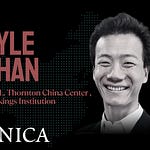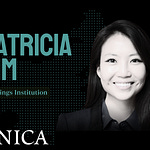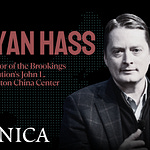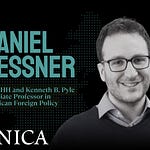This week's podcast was recorded at the Caixin "Talking China's Economy: 2019 Forecasts and Strategies" conference in Chengdu in April. Kaiser spoke with Professor Hé Fān 何帆 of the Antai College of Economics and Management at Shanghai Jiaotong University, and Michael Anti, CEO of Caixin Globus, which tracks Chinese global investment. They chat about how "globalization," which once meant "Americanization" to many Chinese, has taken on a much broader meaning as SAFE concerns over capital flight have reeled in the "gray rhinos" after an investment spree, and as a stricter CFIUS regime has made U.S. investments more difficult. What to listen for on this week’s Sinica Podcast: 7:04: Professor He Fan explains the nature of the bilateral investment relationship between the United States and China in the 21st century: “Recently, the number [of Chinese investment in the United States] in 2017 is above six billion US dollars and accounts for four percent of China’s outbound foreign direct investment. And I haven’t seen — even when talking about [China’s investment in] other parts of the world, the Belt and Road, other countries — but I haven’t seen a dramatic decline of China’s investment in the United States. And if you look at the numbers, I think we tend to overestimate the importance of bilateral investment.” 14:13: How much scrutiny is being placed on Chinese investment in the United States, and what does the outbound investment landscape from China look like at the current moment? Michael: “Actually Chinese companies have two challenges to put the investment out: first, is the government ... But, in terms of the many Chinese internet companies — they have US dollar funds. Because they have US dollars in Hong Kong. Not all in Silicon Valley, not necessarily in Beijing. So that kind of money isn’t really controlled by the Chinese government. Then, they meet the second challenge. The American government, [or] CFIUS. CFIUS is now blocking, I would say 90 percent of Chinese tech investment in the United States.” 19:10: Are immigration and Chinese investment linked? Michael sees a link, and points out investment in southern Europe and Japan as examples - however Professor He Fan pushes back: “I think we can find this link between immigration and investment, but then, it would be very difficult to use this as a proxy to predict where Chinese money will go, because Chinese people are everywhere. I’ve traveled to more than fifty countries and there is only one country where I cannot find many Chinese people. It’s Cuba. Because it’s a planned economy and Chinese people are not allowed to do business there.” He Fan continues, “People are talking about decoupling of China and the United States. For me, it’s very difficult to imagine the decoupling of the two largest economies in the world … to be frank, I think people in Washington D.C. and Beijing tend to overestimate their influence. And people in Chengdu are much better.” 28:13: Who is doing the overseas investment in areas outside of the United States, state-owned enterprises or privately owned enterprises? Professor He Fan introduces the Wenzhou index: “In other foreign markets, in Africa and Southeast Asia for example, my understanding is private companies discovered those new markets first and then [were] followed by some of the state-owned enterprises. So, private companies, like businessmen in Wenzhou and Yiwu, they always move faster than state-owned enterprises.” 42:14: He Fan give a prognosis for China’s relationship with its regional neighbors, Japan and Korea. Besides a notable warming of relations — could the downturn in U.S.-China relations rekindle the bilateral relationship in these countries? He Fan doesn’t think so, whose compass points southward: “I think this improvement of the bilateral relationship between China and Japan is a strategy … there’s no place where China can close the gap, if there’s really decoupling between China and the United States. But, maybe a new market in China will increase their investment and trade in the near future — my guess is Southeast Asia.” Recommendations: Michael: Two TV shows: Billions and The Good Fight. He Fan: His new book, 变量 biàn liàng by Hé Fān 何帆, and a French book, Le piège américain (“The American Trap” in English). Kaiser: A Woman First: First Woman by Selina Meyer and Born a Crime: Stories from a South African Childhood by Trevor Noah.
This podcast was edited and produced by Kaiser Kuo and Jason MacRonald.
See Privacy Policy at https://art19.com/privacy and California Privacy Notice at https://art19.com/privacy#do-not-sell-my-info.












